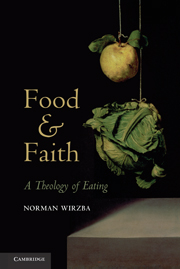Book contents
- Frontmatter
- Contents
- Foreword
- Preface
- 1 Thinking Theologically about Food
- 2 The “Roots” of Eating: Our Life Together in Gardens
- 3 Eating in Exile: Dysfunction in the World of Food
- 4 Life through Death: Sacrificial Eating
- 5 Eucharistic Table Manners: Eating toward Communion
- 6 Saying Grace
- 7 Eating in Heaven? Consummating Communion
- Author Index
- Subject Index
- Scripture Citation Index
3 - Eating in Exile: Dysfunction in the World of Food
Published online by Cambridge University Press: 05 June 2012
- Frontmatter
- Contents
- Foreword
- Preface
- 1 Thinking Theologically about Food
- 2 The “Roots” of Eating: Our Life Together in Gardens
- 3 Eating in Exile: Dysfunction in the World of Food
- 4 Life through Death: Sacrificial Eating
- 5 Eucharistic Table Manners: Eating toward Communion
- 6 Saying Grace
- 7 Eating in Heaven? Consummating Communion
- Author Index
- Subject Index
- Scripture Citation Index
Summary
The willingness to abuse other bodies is the willingness to abuse one's own. To damage the earth is to damage your children. To despise the ground is to despise its fruit: to despise the fruit is to despise its eaters. The wholeness of health is broken by despite.
We no longer live in a world of single threats to the food economy.… we may well be on a course for a perfect storm of sequential or even simultaneous food-related calamities that fundamentally change our ability to maintain food security.
The anorexic body seems to say: I do not need. It says: Power over the self. And our culture, in such a startlingly brief period of time, has come to take literally the idea that power over the body has a ripple effect: power over the body, over the life, over the people around you, power over a world gone berserk.
Today's global, industrial food culture is a culture in exile because it exhibits the marks of injustice, estrangement, and bewilderment. What should we eat, really? Why do many still not have enough to eat when sufficient food is being produced to feed everyone? Why is so much “food” so unhealthy? How long will our soil be able to grow food? Why are there now nearly 500 “dead zones” in our oceans and deltas? Will the spinach, the quintessential symbol of healthy food, make us ill or even kill us?
- Type
- Chapter
- Information
- Food and FaithA Theology of Eating, pp. 71 - 109Publisher: Cambridge University PressPrint publication year: 2011



